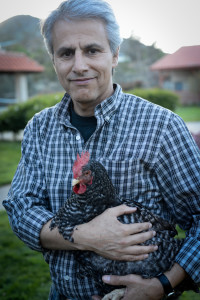by David Clough
Not everyone gets gripped by reading Karl Barth’s Church Dogmatics, but I still remember the time I first read what he has to say about being a creature. He writes that being a creature means being limited. Being a creature means having a beginning and an end, and having a particular calling from God. For Barth, these creaturely limits aren’t a negative for us. They mean freedom and opportunity: the chance to act in free response to God in the time and place where we find ourselves. I found this liberating. I realized I was a small and limited creature of God, born in a particular place and time, called to do the particular thing I was fitted to do, by the God who made me, loved me, and knew where my true freedom lay. Realizing what it truly meant to be a human creature was a new step in faith for me.
Barth also saw that we are one creature among many. He pictures the whole creation praising God, from the angels to the smallest creatures. When humans praise God, he says, they are like late-comers, slipping shame-faced into the back of creation’s choir, which has never ceased its praise, and cannot understand why humans don’t cooperate in the jubilation surrounding them.
Stars praise God in their power and magnificence. Mountains praise God in their grandeur and solidity. Rivers praise God in their flow and provision for life. The cedars of Lebanon praise God in their stature and strength. The honey bees praise God in their intricacy, complex cooperation, and sweet productivity. The hawks praise God in their mastery of the air and piercing eye-sight. The blue whales praise God in their deep and massive peace and grace. The dogs praise God in their sociality and focused attention. The cats praise God in their sleekness and grace. The pigs praise God in their care for one another and intelligent pursuit of nourishment. The chickens praise God in their plumage, the nurturing of their chicks, and their crowing. And we human creatures, from time to time, also praise God in our own ways.
Seeing ourselves as one creature among many is therefore a profound truth of Christian faith. There are two kinds of things: God and God’s creatures. We’re one of the second kind: we’re creaturekind. Like every other creature, we are made by God. Like every other creature, we have a beginning and end. Like every other creature, we exist in a particular time and place. Like every other creature, we glorify God in our existence. Like every other creature, we are called to offer praise in our particular creaturely way.
So seeing ourselves as creaturekind changes the way we see ourselves. But it also changes the way we see other creatures. We see that we are one among many of God’s beloved creatures, each of them also a creature with a beginning and end. Just as we are well aware of our vulnerability as human creatures, and the vulnerability of the humans we love, so we become aware of the vulnerability of the creatures around us, many of whose lives are even more fragile than our own. We become aware of the power we exercise over these other creatures: how our lives impact on theirs without us even noticing.
Pope Francis’s recent encyclical Laudato Si quotes the book of Wisdom:
“For you love all things that exist, and detest none of the things that you have made; for you would not have made anything if you had hated it” (Wis 11:24). Every creature is thus the object of the Father’s tenderness, who gives it its place in the world. Even the fleeting life of the least of beings is the object of his love, and in its few seconds of existence, God enfolds it with his affection. (§77)
If our love is to be shaped by God’s love, it must extend to all that God loves. That means part of the vocation to be a human creature is to show God’s love to all God’s creatures.
So, soon after we see that we are creaturekind, we see that we must be creaturekind. Our identity as one of the creatures God loved into being means we see our responsibility to take care in our dealings with other creatures.
Being limited creatures, we can’t always be creaturekind to all creatures. But there are some things that clearly lie within our limited power. The biggest step we can take is to stop participating in the cruelty on a massive scale we are currently inflicting on farmed animals (see last week’s blog). It’s time for Christians to be creaturekind towards farmed animals.
(If you want to read more of Barth on creaturely limits, you can find it in Church Dogmatics, vol. III/4, §56. His image of the creaturely choir is in vol. II/1, §31.3, p. 648.)

